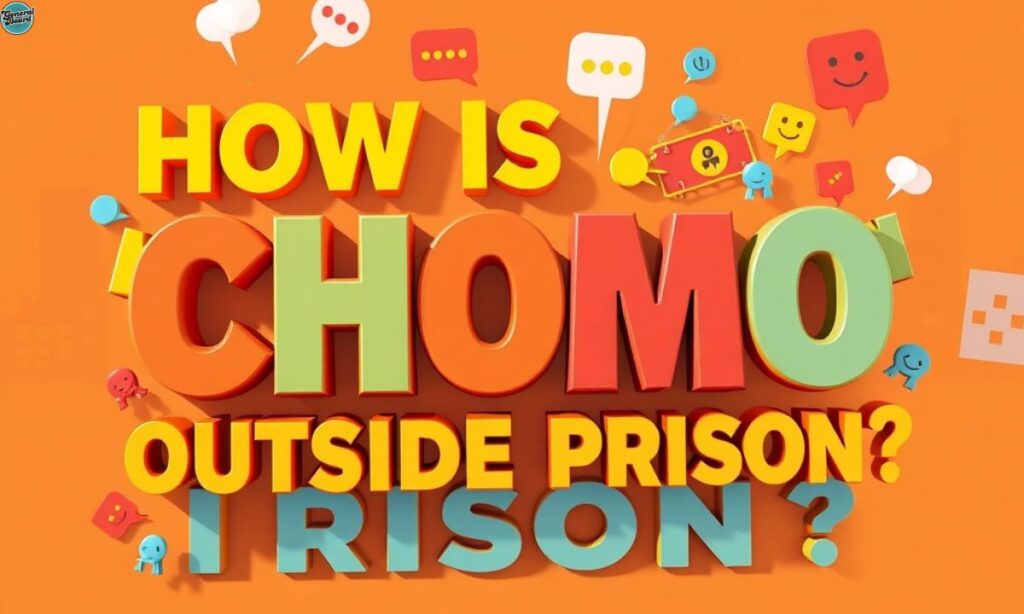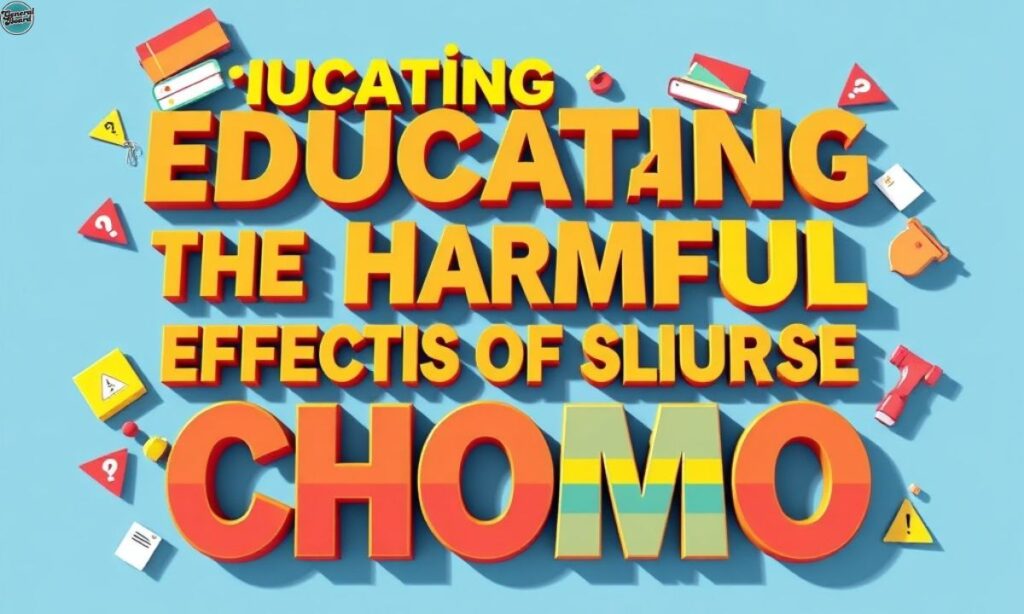The term “chomo” is a slang abbreviation for “child molester,” commonly used in prison and criminal justice circles. It’s a highly stigmatized label that carries serious social and physical consequences, especially within prison environments.
“Chomo” has also surfaced in online discussions and street slang, often used as a strong insult or accusation. Despite its casual use in some circles, the term implies serious criminal behavior and should never be taken lightly.
This guide explores the full meaning, origin, and evolution of the word “chomo,” along with how it’s used and perceived across different settings. We’ll also examine its broader cultural impact and why it’s considered one of the most dangerous labels in certain environments.
The Meaning of “Chomo”
The term “chomo” is a slang abbreviation for “child molester,” most commonly used in prisons and criminal justice environments. It identifies individuals convicted of or accused of crimes against children, particularly sexual offenses.
In prison culture, being labeled a chomo is extremely dangerous, as such individuals are often isolated or targeted by other inmates. The label carries a strong stigma and can lead to violence or exclusion within the prison hierarchy.
Outside of prison, “chomo” may be used in online or street slang, typically as a severe insult. However, due to the serious implications, using the term loosely or without evidence is considered highly irresponsible and harmful.
The Origin and Evolution of the Word “Chomo”
The word “chomo” originated in the U.S. prison system as a shortened slang term for “child molester.” It was used by inmates to quickly identify individuals convicted of crimes against children, who are often viewed with extreme contempt and targeted for violence. Over time, the term spread beyond prison walls into street slang and online spaces, though it still carries a deeply negative and serious connotation.
Early Prison Slang Origins:
The word “chomo” originated as prison slang in the United States, combining “child” and “molester” into a shortened, coded term. It was used among inmates to identify and isolate those convicted of crimes against children, who are considered the lowest in the prison social order.
Spread to Popular Culture and Online Use:
Over time, “chomo” spread beyond prison walls and began appearing in street slang and online communities. While it’s sometimes used casually or as an insult, its origins and serious implications remain deeply tied to criminal behavior and societal condemnation.
What Does “Chomo” Mean in Prison Culture?
In prison culture, “chomo” is a highly derogatory term for inmates convicted of crimes against children. Those labeled as chomos are viewed with extreme contempt and are often isolated or targeted for violence. The term carries severe social stigma and can drastically affect an inmate’s safety and status.
Prison Social Hierarchy and Stigma
Prison social hierarchy ranks inmates based on power, respect, and survival skills. Those with gang ties or toughness often dominate the social structure inside.
Stigma further divides prisoners, where certain offenses or perceived weaknesses lead to isolation. This labeling shapes how inmates interact and influences their safety and status.
Why the Term Is So Loaded
The term “prison” carries a heavy emotional weight tied to punishment and loss of freedom. It often triggers societal judgment and fear, beyond just describing a place.
It also symbolizes broader issues like inequality and justice, making it a charged word in discussions about crime and reform. The term evokes strong feelings about human rights and social order.
How Is “Chomo” Used Outside Prison?

Outside prison, “chomo” is often used as a harsh insult aimed at accusing someone of being a child molester. It carries strong negative judgment and is meant to shame the person targeted.The term has spread beyond prisons into everyday language in some communities, reflecting deep societal fears and moral condemnation of such crimes.
Use on Social Media and Internet Forums
On social media and internet forums, “chomo” is frequently used as a derogatory label to attack or humiliate others. It can quickly spread in online arguments, often without evidence.
This usage reflects how slang from prison culture has infiltrated digital spaces, sometimes fueling harsh online bullying and stigmatization.
Consequences of Misuse Online
Misusing “chomo” online can lead to serious harm, including defamation and emotional distress for those falsely accused. It contributes to a toxic environment where rumors and hate spread easily.
Such misuse also undermines genuine efforts to address abuse by diluting the seriousness of accusations and increasing stigma for all involved.
Legal Aspects of Using the Term “Chomo”
The term “chomo” has no official standing in legal systems and is not recognized as a formal charge or classification. It is purely slang, used informally rather than in courtrooms.Because it’s not a legal term, its use can cause confusion or misinterpretation, especially when people treat it as a serious accusation outside prison culture.
“Chomo” Is Not a Legal Term
“Chomo” lacks any precise legal definition and does not appear in statutes or legal documents. It is a street term reflecting social stigma, not legal fact.
Using it as if it were a formal label can mislead people about someone’s actual criminal record or status, which may have serious consequences.
Risks of Defamation and Libel
Calling someone “chomo” publicly can lead to defamation or libel claims if the accusation is false or damaging. This is because it implies criminal behavior that seriously harms reputation.
Such misuse carries legal risks, including lawsuits and financial penalties, especially when shared widely on social media or other public forums.
Psychological and Social Impact of the Label “Chomo”
Being labeled “chomo” carries intense social stigma that isolates individuals both inside and outside prison. This label marks a person as one of the lowest in social standing, deeply affecting relationships.The fear and shame associated with the term can lead to anxiety, depression, and feelings of worthlessness. It creates lasting psychological scars that are hard to overcome.
Mental Health Effects in Prison
Inside prison, being called “chomo” often results in extreme bullying, violence, and social exclusion. This hostile environment increases stress and can trigger severe mental health issues.
The label can make prisoners targets for abuse, which exacerbates trauma and hinders any chance of rehabilitation or personal growth.
Outside Prison Impact
Outside prison, the “chomo” label can destroy reputations and make reintegration into society nearly impossible. It leads to social rejection and loss of support networks.
This stigma can cause long-term emotional distress, preventing individuals from finding jobs, housing, or rebuilding their lives.
How the Media Portrays “Chomo”
The media often portrays “chomo” in a sensationalized and negative light, emphasizing fear and disgust. This depiction reinforces stereotypes and deepens public stigma.Such portrayals rarely explore the complexities behind the label, focusing instead on shock value that can misinform audiences.
Representation in Movies and Documentaries
Movies and documentaries sometimes use “chomo” characters to highlight prison realities or crime stories. However, these representations can be one-dimensional and reinforce harsh judgments.
When done thoughtfully, they can raise awareness about the consequences of labeling, but often they lack nuance and contribute to stigma.
Importance of Context in Media
Context is crucial when the media discusses or uses the term “chomo.” Without it, the term can be misunderstood or misapplied, spreading misinformation.
Better Language Alternatives to “Chomo”
Using neutral terms like “sex offender” or “convicted offender” provides clarity without slang. These alternatives focus on facts rather than insults.Respectful language helps reduce stigma and encourages more constructive conversations about rehabilitation and justice.
Neutral and Respectful Terms
- Individual with a history of sexual offense
- Person convicted of a sexual crime
- Someone with a sexual offense record
- Individual who has served time for sexual offenses
- Person with a past conviction related to sexual misconduct
- Former offender (when referring to someone who has completed their sentence)
- Person engaged in rehabilitation for sexual offenses
Why Alternatives Matter
Alternatives to stigmatizing terms help reduce social exclusion and mental health harm. They create opportunities for positive change and reintegration.
Choosing better language shifts the conversation from blame to support, improving outcomes for individuals and communities alike.
Educating About the Harmful Effects of Slurs Like “Chomo”

Raising awareness about the damage caused by slurs helps reduce stigma and bullying. Education fosters empathy and promotes respect for all individuals.Understanding the psychological harm these terms cause is key to creating safer, more inclusive environments.
Raising Public Awareness
Public campaigns can inform people about the negative impact of harmful language. Awareness encourages society to rethink casual use of damaging slurs.
This helps build a culture where words are chosen carefully to avoid reinforcing prejudice and pain.
Promoting Responsible Language Use
Encouraging people to use respectful language fosters better communication and understanding. Responsible language promotes dignity and reduces social harm.
It also sets a positive example for younger generations and helps shift societal norms.
The Future of the Term “Chomo” and Prison Slang
Prison slang like “chomo” may lose popularity as awareness grows about its harm. Changing attitudes can push such terms out of everyday use.However, without education and intervention, these slurs risk persisting or evolving in new ways.
Will “Chomo” Become Mainstream?
The term could become more mainstream through social media but at the risk of spreading misinformation. Increased visibility might normalize harmful stereotypes.
Conversely, mainstream rejection could limit its use and promote more respectful language alternatives.
The Role of Digital Media
Digital media amplifies both the spread and challenge of terms like “chomo.” It can either reinforce stigma or be a platform for education and change.
Frequently Asked Questions
What exactly does “chomo” mean?
“Chomo” is prison slang for someone accused of being a child molester or sex offender.
Is “chomo” a legal term?
No, “chomo” is not a legal term and has no official status in the justice system.
Where did the word come from?
The word “chomo” originated in U.S. prison culture as a shorthand for “child molester.”
Is it offensive to call someone a “chomo”?
Yes, it is a highly offensive and stigmatizing slur used to shame and isolate individuals.
Can “chomo” have other meanings?
Generally, “chomo” specifically refers to child molesters in prison slang and rarely has other meanings.
Conclusion
The term “chomo” is a deeply charged slang word originating from prison culture, used to label individuals accused of child molestation. Its meaning carries severe social stigma and consequences, reflecting a harsh judgment within and beyond prison walls. Understanding its origin and usage helps shed light on the complex social dynamics and psychological impact tied to this label.
Culturally, “chomo” reveals how language can both reflect and reinforce societal fears and prejudices. While it serves as a powerful term within certain communities, its misuse and spread—especially online—can cause lasting harm. Raising awareness about respectful alternatives and the consequences of such slurs is vital to fostering empathy, reducing stigma, and promoting more constructive conversations about justice and rehabilitation.